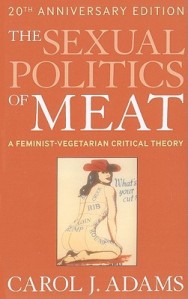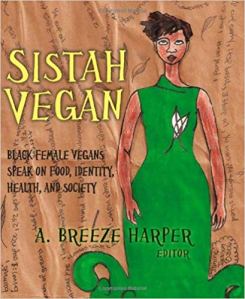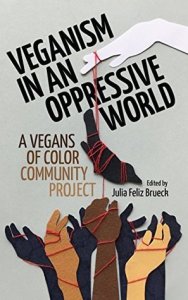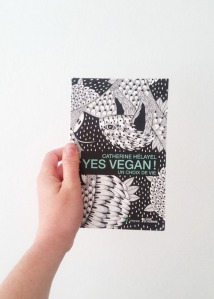
Rating: ★★★★★
Genre: Nonfiction, feminist lit, vegan lit
Synopsis: The first of its kind, Adams dissects the ways in which vegetarian and feminist discourse are similar, and how both vegetarianism/veganism and feminism can benefit if they rely on one another. Think to the exploitation of female bodies, think to the silence that is wanted. Think to the pounds and pounds upon violence and death are afforded to who is considered lesser.
Review: There has never been a book that has captivated me so much in terms of both vegetarian and feminist theory. Finally, someone gets it, they really really get it. She understands the exploitation of female bodies, she understands the fact that we are supposed to be silent and complicit in our own oppression, she understands that our culture and media and institutions want meat to be on our plates, want women to be submissive, want the total domination of those supposedly weaker and lesser.
Through anecdotes, studies, and analyses of billboards and commercials, Carol J. Adams takes no prisoners with her analysis. Perhaps my favorite quotation from the book is this: “Vegetarianism announces that it will destroy the pleasure of meals as they are now experienced. Thus it is a given that vegetarians will be unable to determine the shape of the discourse when eating with meat eaters. But, it is inevitable that vegetarians will eat with meat eaters; and it is also inevitable that the absence of meat on their table will touch off a discussion. In this situation, the issue of vegetarianism is a form of meat to meat eaters: it is something to be trapped and dismembered.” HOT DAMN. How was it that she was able to describe every single meal I’ve had with my family ever?
I remember when I first announced that I was going vegan. “Why? What compelled you? That’ll last a week. We’ll just slip eggs into whatever you’re eating.” Thanks, guys. And now that it’s been five years, the conversation still remains. Family members won’t even try the most non-vegan approved foods like the Impossible Burger, a tofu scramble, mac and cheese, or even Earth Balance butter. I thought it’d be obvious that we wouldn’t be eating these things if they were actually disgusting…but go off, I guess. Every new person I meet asks, “Oh, why did you decide to go vegan?” And I ask them, “Do you want the real answer, or the nice answer?” The nice answer consists of me explaining that I learned some very unpleasant things and thusly changed my dietary habits. The real answer consists of me telling them about how unjust it is that baby chicks who are expected to grow into egg-laying hens are sexed on day 2 of their lives, and the males are either gassed, crushed, or thrown out like garbage. Not exactly a fun conversation starter… Just as Carol J. Adams wrote decades ago, my lack of meat was the meat.
And, just as she wrote, it held true and still holds true that women’s bodies are the meat. Are men boobs or ass men? Maybe thighs? Our bodies are symbolically ripped apart to be digested by the patriarchal institutions that run not only our lives but the food we eat.
Is Carol J. Adams the Andrea Dworkin of vegetarian critical theory? Yes. Yes. A thousand times yes.


